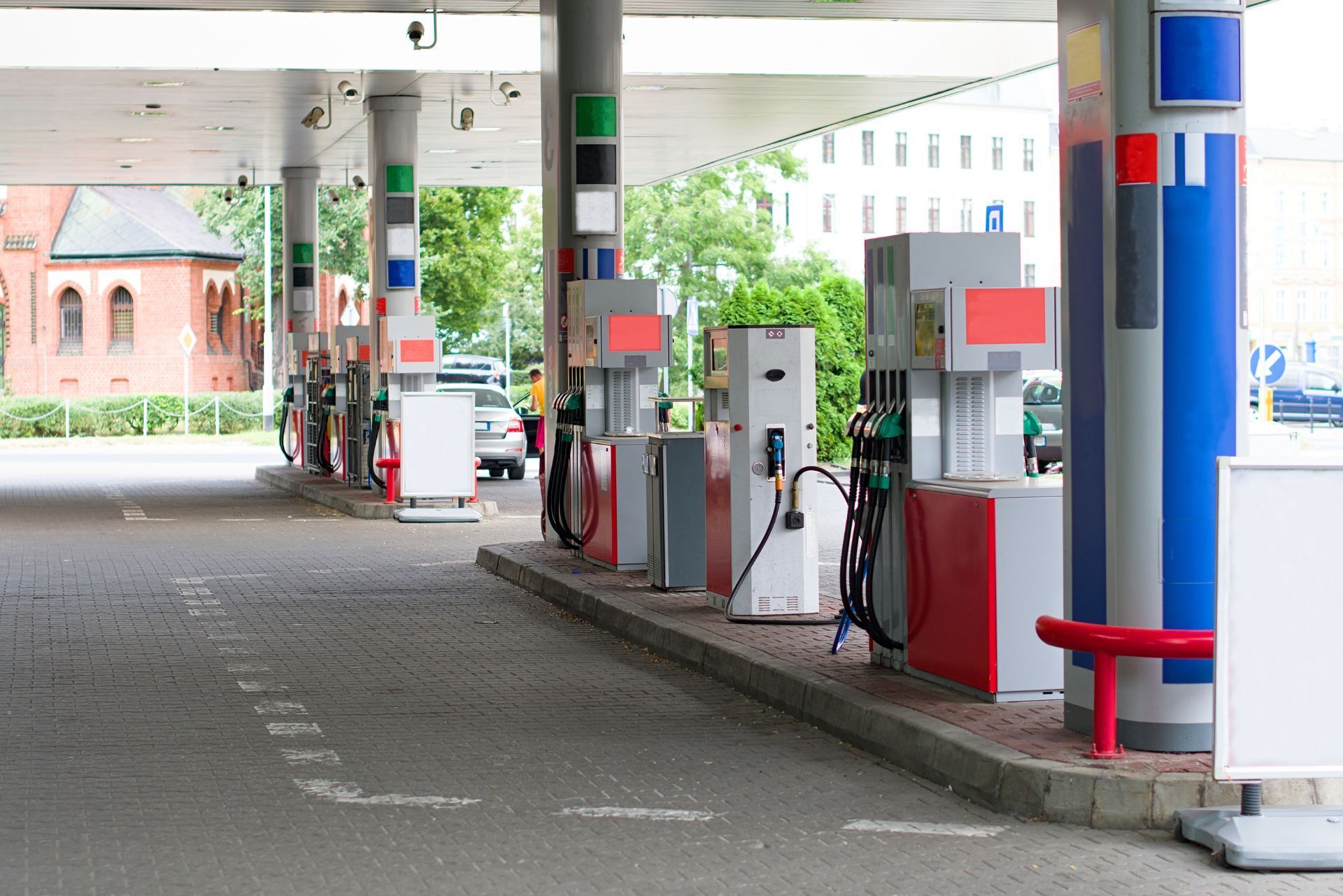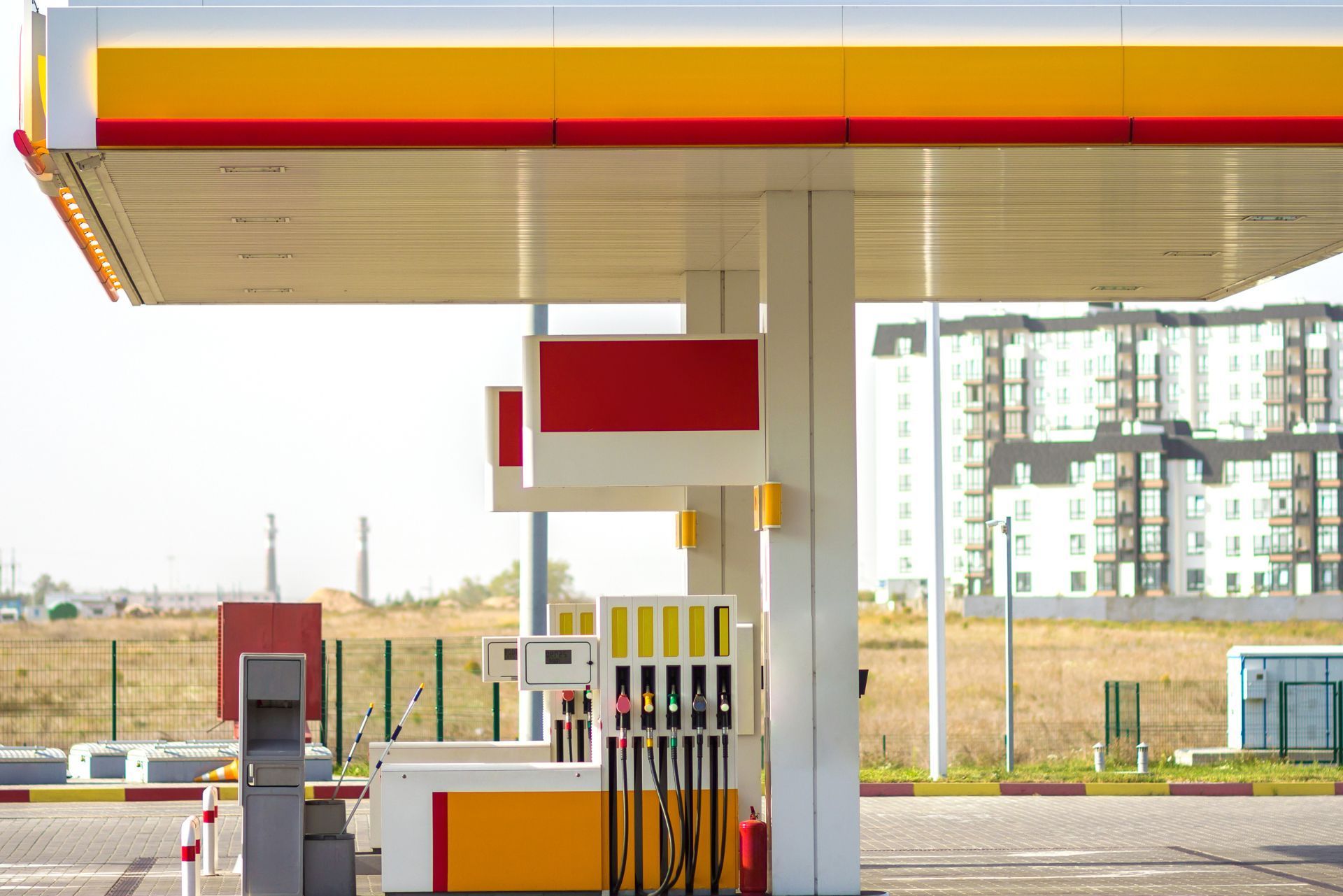Common Business Insurance Policies
By: Matt Larsen
Owner of Capstone Insurance Group & Restaurant Insurance Advisor
763-242-1668
Index
Contact Us
Phone
Location
Operating a gas station in Minnesota comes with numerous responsibilities and potential risks. Gas station insurance is designed to protect business owners from various liabilities while ensuring they can recover from unforeseen incidents. This guide will delve into the essential aspects of gas station insurance, including types of coverage, how to choose the right provider, and navigating claims processes.
Understanding the Basics of Gas Station Insurance
Gas station insurance is a specialized form of coverage tailored to address the unique risks associated with operating a gas station. Because these establishments deal with flammable substances, food service, convenience stores, and other complex operations, customized insurance policies are critical.
Importance of Gas Station Insurance in Minnesota
In Minnesota, gas stations face various risks, including fire hazards, liability claims from customers, and property damage due to vandalism or accidents. Having a robust insurance policy helps mitigate these risks, ensuring that business owners can recover financially from significant losses.
Moreover, gas stations play a vital role in the community. They provide essential services to motorists and, in many cases, local goods. With such importance comes the responsibility to protect both employees and customers, making comprehensive insurance coverage indispensable. In rural areas, gas stations often serve as the only source of fuel and convenience items for miles, highlighting their critical role in maintaining local economies and accessibility.
Key Components of a Gas Station Insurance Policy
A well-structured gas station insurance policy typically includes the following key components:
- Property coverage
- General liability insurance
- Workers' compensation insurance
- Business interruption insurance
- Environmental liability coverage
Each of these components serves a specific purpose, ensuring that both the physical assets and the operational viability of the gas station are safeguarded against various risks. For instance, property coverage protects the building and equipment from damage caused by fire or natural disasters, while general liability insurance shields the business from claims arising from accidents on the premises, such as slips and falls. Workers' compensation insurance is essential for covering medical expenses and lost wages for employees injured on the job, which is particularly important in a bustling environment like a gas station where the risk of accidents is heightened.
Additionally, business interruption insurance can be a lifesaver in the event of a catastrophic incident that forces the gas station to close temporarily. This coverage helps replace lost income and pay ongoing expenses, allowing business owners to navigate through challenging times without facing financial ruin. Environmental liability coverage is also crucial, as gas stations must comply with strict regulations regarding fuel storage and potential leaks. This component protects against the costs associated with environmental clean-up and legal liabilities, ensuring that the business remains compliant with state and federal laws while safeguarding the surrounding community.

Types of Coverage for Minnesota Gas Stations
It's important for gas station operators in Minnesota to understand the different types of coverage available to them. This knowledge helps in crafting a policy that encompasses all aspects of their business operations.
Property Insurance for Gas Stations
Property insurance covers the physical structures of the gas station, including the fuel pumps, convenience store, and storage areas. It protects against losses due to fire, theft, vandalism, or natural disasters. For gas stations, where a large part of the investment lies in the infrastructure, this coverage is crucial.
Furthermore, business owners should assess the value of their assets regularly to ensure their coverage limits remain adequate. Underinsurance can lead to significant financial strain during recovery from an incident. In addition to standard property coverage, gas station owners may also want to consider endorsements for specific risks, such as pollution liability, which can arise from fuel spills or leaks, a concern particularly relevant in the fuel retail industry.
Liability Insurance for Gas Stations
Liability insurance is designed to protect the gas station owner from claims of bodily injury or property damage sustained by customers while on the premises. Given the nature of the business, the risk of accidents is prevalent, making this type of coverage a necessity.
Additionally, liability insurance can cover legal fees in the event of a lawsuit, offering further protection against potential financial repercussions. As gas stations often serve hundreds of customers daily, ensuring comprehensive liability coverage is essential. Operators should also consider additional options such as product liability insurance, which protects against claims arising from products sold in the convenience store, including food items and beverages that may cause harm to consumers.
Workers' Compensation Insurance
Workers' compensation insurance is mandated for businesses with employees in Minnesota. This coverage protects workers who may suffer injuries while performing their job duties. In a gas station setting, this could include accidents at fuel pumps or injuries while handling delivery goods.
Business owners should remain informed about the specific requirements and benefits associated with workers’ compensation to ensure compliance and the well-being of their staff. Moreover, implementing safety training programs can significantly reduce the likelihood of workplace accidents, potentially lowering workers' compensation premiums over time. Regular safety audits and employee training sessions not only foster a safer work environment but also demonstrate a commitment to employee welfare, which can enhance the overall reputation of the gas station in the community.
How to Choose the Right Insurance Provider
Selecting the right insurance provider is critical to securing optimal coverage for your gas station. Not all insurers design their policies with the specific needs of gas stations in mind.
Evaluating Insurance Providers: What to Look For
When evaluating potential insurance providers, consider their experience in the gas station industry. An insurer familiar with the unique risks faced by gas stations is more likely to offer tailored solutions and understand your operational challenges. This includes knowledge about environmental regulations, fuel storage requirements, and the potential for liability claims arising from customer interactions or accidents on your premises.
Moreover, assess their financial stability, reputation, and claim handling process. Choose companies with high customer satisfaction ratings and prompt claims processing to ensure peace of mind in times of need. A provider's track record in the industry can often be gauged through reviews and testimonials from other gas station owners, which can shed light on their reliability and customer service quality.
Questions to Ask Potential Insurance Providers
Before purchasing insurance, ensure to ask the following questions:
- What specific coverage options are available for my gas station?
- How do you handle claims processing, and what is the average response time?
- Are there any exclusions or limitations in the policy I should be aware of?
- How does your pricing compare to other providers in the market?
These inquiries can provide valuable insights that help determine whether a specific provider will meet your needs effectively. Additionally, it may be beneficial to ask about any discounts for bundling policies or for implementing safety measures that reduce risk. Understanding the full scope of what your insurance provider offers can lead to significant savings and enhanced protection.
Furthermore, consider the level of customer support provided by the insurer. Having access to knowledgeable representatives who can assist you in navigating policy details or claims can make a significant difference, especially during stressful situations. Inquire about their availability for consultations and whether they offer resources or tools to help you manage your insurance needs proactively. A provider that prioritizes customer education and support can be an invaluable partner in your business's success.

Cost of Gas Station Insurance in Minnesota
The cost of gas station insurance can vary based on numerous factors. Understanding these factors can aid in budgeting and potentially securing better rates.
Factors Influencing Insurance Premiums
Several factors influence the premiums for gas station insurance, including:
- Location of the gas station
- Size and condition of the property
- Type of operation (full-service vs. self-service)
- Claims history and risk management practices
- Coverage limits and deductibles chosen
Having a comprehensive understanding of these factors allows owners to recognize potential cost-saving opportunities when evaluating their insurance policies. For instance, gas stations located in high-traffic urban areas may face higher premiums due to increased liability risks and the potential for accidents. Conversely, a gas station situated in a rural area may benefit from lower rates, provided it has a solid safety record. Additionally, the age and maintenance of the property can significantly impact costs; well-maintained facilities often qualify for lower premiums due to reduced risk of claims.
Tips to Lower Your Gas Station Insurance Costs
To reduce insurance costs without sacrificing coverage, consider the following strategies:
- Increase deductibles to lower premiums, if financially feasible.
- Implement safety measures and training programs to minimize accidents and claims.
- Bundle coverage with one insurance provider for multi-policy discounts.
- Review and adjust coverage regularly to eliminate unnecessary expenses.
These proactive steps can help ensure that gas station owners maintain both adequate coverage and manageable insurance costs. Furthermore, engaging with an insurance broker who specializes in commercial policies can provide valuable insights into the nuances of gas station insurance. Brokers can help identify tailored coverage options that address specific risks associated with fuel storage, environmental liabilities, and employee safety. By staying informed about industry trends and regulatory changes, gas station owners can also anticipate potential impacts on their insurance needs, allowing them to make informed decisions that align with their business goals.
Understanding the claims process is vital for gas station owners, as a smooth experience can significantly impact recovery after an incident.
Steps to Filing an Insurance Claim
Filing a claim involves several critical steps:
- Notify your insurance provider as soon as possible after the incident.
- Document the incident thoroughly, including photos and witness statements.
- Complete the claim forms accurately, providing all requested information.
- Follow up with your insurance adjuster to ensure progress.
Being systematic in the claims process can help facilitate a quicker resolution and minimize disruptions to your operations. Additionally, it’s wise to keep a detailed log of all communications with your insurance company, including dates, times, and the names of representatives you speak with. This record can be invaluable if discrepancies arise later in the process, as it provides a clear timeline of your interactions and can help clarify any misunderstandings.
Furthermore, gas station owners should consider consulting with a claims advocate or an attorney who specializes in insurance claims. These professionals can provide guidance on how to present your claim effectively and may help ensure that you receive the full compensation you are entitled to. Their expertise can be particularly beneficial in complex cases where disputes may arise regarding coverage or the extent of damages.
Understanding the Role of Insurance Adjusters
Insurance adjusters are appointed by insurance companies to investigate claims. Their role is to assess the damage, evaluate the legitimacy of the claim, and determine the payout amount. Understanding this role can help gas station owners navigate the process more effectively.
Engaging respectfully and cooperatively with adjusters often leads to more favorable outcomes, ensuring that businesses receive the compensation they need. It's important to remember that adjusters are not adversaries; they are tasked with gathering information to make an informed decision about your claim. Building a rapport with them can facilitate smoother communication and may even expedite the evaluation process. Additionally, providing them with organized documentation and being open to answering questions can help streamline their investigation, potentially leading to a quicker resolution.
Moreover, gas station owners should be aware that adjusters may also consult with experts, such as contractors or engineers, to assess damages accurately. Being prepared for this possibility means ensuring that your own documentation is thorough and clear, which can help reinforce your case. Understanding the nuances of how adjusters operate can empower owners to advocate for their interests while maintaining a constructive relationship throughout the claims process.
Regulatory Requirements for Gas Station Insurance in Minnesota
Gas station insurance is subject to several regulatory requirements that vary by state. Understanding and complying with these regulations is essential to operate legally.
State-Specific Insurance Requirements
In Minnesota, businesses are required to carry minimum coverage for liability and workers’ compensation. Depending on the size of the gas station and the number of employees, additional types of coverage may be beneficial or mandatory. For instance, pollution liability insurance is particularly crucial for gas stations, as they handle hazardous materials that can lead to environmental contamination. This type of coverage protects against claims arising from spills or leaks, which can be both costly and damaging to a business’s reputation.
Stay informed about any changes in state regulations, as compliance is crucial in avoiding penalties or operational disruptions. Moreover, it is advisable for gas station owners to consult with insurance professionals who specialize in the petroleum industry. These experts can provide tailored advice on the best coverage options based on individual business needs, ensuring that operators are adequately protected against a variety of risks.
Consequences of Non-Compliance with Insurance Regulations
Failing to meet state insurance requirements can result in severe penalties, including fines and potential legal action. Additionally, an uninsured incident can lead to significant out-of-pocket costs that could jeopardize the business’s financial stability. In some cases, non-compliance may also lead to the suspension of the gas station's operating license, effectively halting business operations until compliance is achieved. This can result in lost revenue and a tarnished reputation within the community.
Thus, understanding and adhering to insurance regulations is indispensable for any gas station operator in Minnesota. Regular training sessions for employees about safety protocols and insurance requirements can further enhance compliance and minimize risks. Furthermore, maintaining open communication with local regulatory bodies can help gas station owners stay ahead of any upcoming changes in legislation, ensuring that they remain compliant and prepared for any challenges that may arise.

Future of Gas Station Insurance in Minnesota
As the industry evolves, so too does the landscape of gas station insurance. Staying ahead of trends is vital for operators looking to optimize their coverage.
Impact of Technological Advancements on Insurance
Technological innovations, such as telematics and automation, are influencing insurance offerings. These advancements can provide real-time data on risk factors, enabling insurers to create more tailored policies and potentially lower premiums for businesses that adopt safe practices.
Furthermore, advancements in security technology can help minimize risks associated with property theft or vandalism, thus positively impacting insurance costs.
Predicted Trends in Gas Station Insurance
Looking to the future, expect trends such as increased emphasis on environmental sustainability and digital data management. Gas stations may be required to adopt more comprehensive environmental liability policies due to regulatory pressures.
Moreover, the shift towards electric vehicles may prompt adjustments in coverage options, reflecting the changing nature of fuel service operations.
As such, gas station owners in Minnesota must remain vigilant and proactive regarding their insurance needs to ensure they are adequately protected against emerging risks.
In conclusion, understanding and effectively managing gas station insurance is critical for operators in Minnesota. This comprehensive guide has addressed various facets, from the basics of coverage to navigating claims and understanding future trends. By staying informed and proactive, gas station owners can secure their businesses against risks while contributing to the community with confidence.






